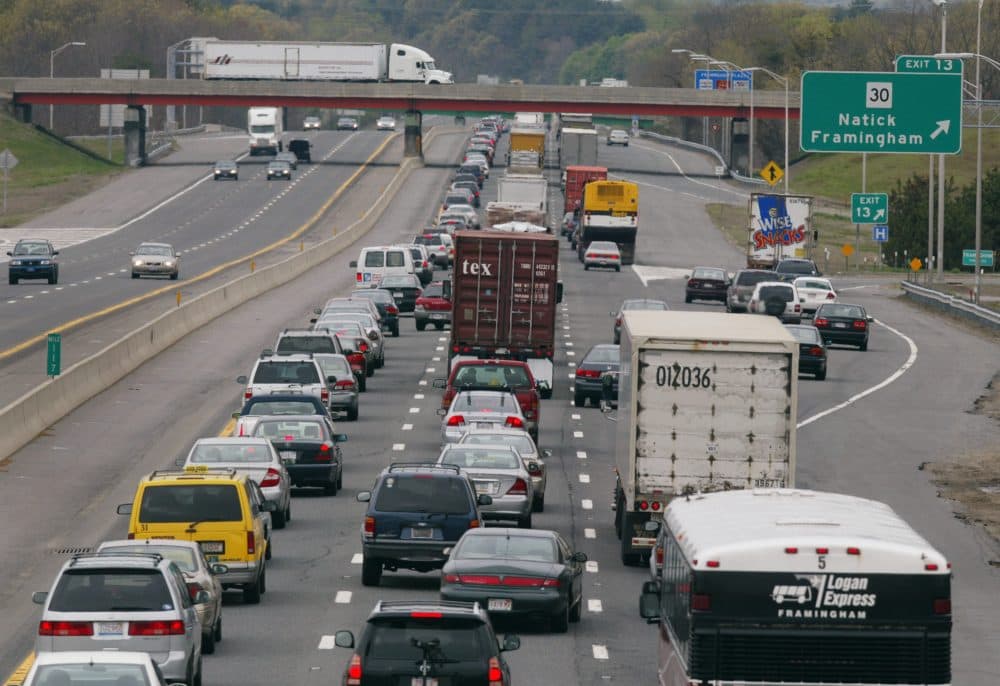Advertisement
The Gas Tax Is So 20th Century. Here Are Two New Ones That Should Replace It

When you ask voters whether or not a tax should be increased, the results are predictable. Such was the case in 2014 when Massachusetts voted to repeal a law that indexed the tax on gasoline to inflation. Our Department of Transportation estimates that the repeal will reduce gas tax revenues by $1 billion over a decade.
Like most states, Massachusetts relies on a fuel tax to fund its highway system, but the revenues have not kept up with the cost of maintaining the commonwealth’s roads, bridges and tunnels. In today’s dollars, the state gas tax rate is just 69 percent of what it was in 1993. So it’s no surprise that 40 percent of our roads are in poor condition, and 52 percent of our bridges need structural repairs, according to a national transportation research group.
Shouldn’t Tesla owners have to pay their fair share to maintain roads and bridges?
It’s not just inflation that’s eroding the revenues from the gas tax. Millennials are walking, biking and using public transit instead of driving, and they’re putting off car purchases. Cars are getting more fuel-efficient, and electric vehicles are becoming more common.
It’s inevitable that revenue from the gas tax will continue to fall. As James Aloisi, former Massachusetts secretary of transportation, has said, “The gas tax is a twentieth-century dinosaur, and we need to recognize that fact and move on.”
Not only does the gas tax generate too little revenue, it’s also not entirely fair. Gas consumption is no longer a reliable indicator of how much wear and tear a vehicle is causing on the roadways. Shouldn’t Tesla owners have to pay their fair share to maintain roads and bridges?
An arguably more just alternative to the gas tax is a tax on actual road usage, commonly referred to as a vehicle-miles-traveled, or VMT, tax. Instead of paying at the pump, motorists pay a few pennies for each mile they drive. The idea has been around a while, and several states, most notably Oregon, have experimented with it.
In its simplest form, the computation of the VMT tax relies on odometer readings. It can also be implemented using transponder technology, similar to electronic tolling. More sophisticated approaches use on-board computers, some with GPS, which compute the tax based on distance traveled, as well as other factors, such as the time of day and the type of road.
Advertisement
Gov. Charlie Baker recently vetoed a provision in a highway-financing bill that would have created a pilot program to test the VMT tax here in Massachusetts, a move that drew praise from the Boston Herald and criticism from the Boston Globe. Legislators may revisit the measure in the next session. Because gas tax revenues will continue to decline, the state will eventually have to adopt a mileage-based tax.
But the idea of replacing the gas tax with a VMT tax has its share of critics, especially in environmental circles. Although the statutory purpose of the gas tax is to fund the transportation system, it also functions as a pollution tax. Instituting a VMT tax and eliminating the gas tax would lower the incentive to buy a fuel-efficient hybrid or electric vehicle. At a time when the state is working hard to reduce carbon emissions, it doesn’t make sense to treat a Nissan Leaf the same as a Chevy Suburban.
So while it’s clear that we’ll ultimately need to fund our transportation infrastructure with a VMT tax, it’s equally clear that we need to legislate incentives to burn less gasoline, too.
The solution is to pair a VMT tax with a carbon tax, which the state would assess on all carbon-based fuels. The purpose of a carbon tax wouldn’t be to raise revenue; rather it would foster consumer and business decisions that result in lower carbon emissions in all sectors of the economy. A carbon tax would boost the priority of fuel efficiency when people shop for a new vehicle, for example, and it would steer people toward using modes of transportation other than driving when possible.
Instituting a VMT tax and eliminating the gas tax would lower the incentive to buy a fuel-efficient hybrid or electric vehicle.
British Columbia implemented a very successful “revenue-neutral” carbon tax that returns all the tax receipts to the taxpayers via reductions to income and corporate taxes. Carbon emissions in the province have dropped, and economic growth has surpassed the rest of the country.
The Massachusetts Legislature flirted with a revenue-neutral carbon pricing scheme in the last session, but the political support to get it past legislative leaders didn’t materialize. That bill is likely to return for another look next year.
You can already hear the chant of “no new taxes.” But a VMT tax in combination with a revenue-neutral carbon tax would put a price on carbon pollution while ensuring adequate funding of our economically crucial highway system. New problems call for new ideas, and new taxes make sense when they replace those that no longer work.
